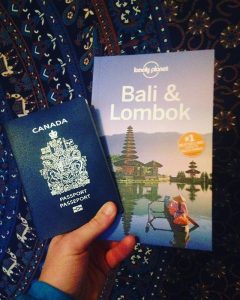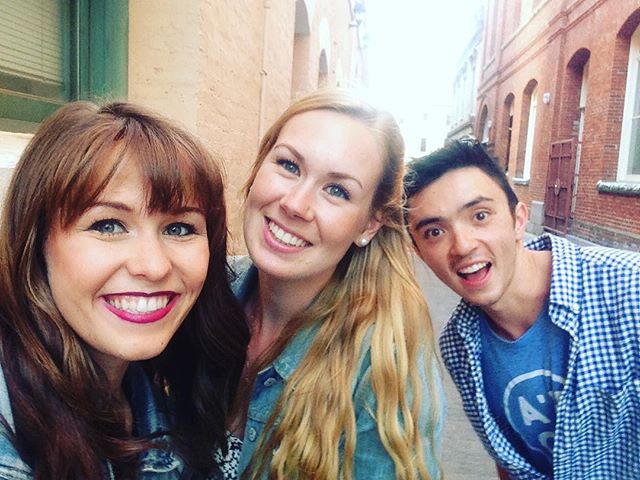Bali Bound: The One Million Things to Think About when Preparing for an Exchange or Co-op Abroad
We are young, we are bright, and we are resilient — what better time in life to do something scary and move to another country than when you’re in university?
I have always loved to travel, and although I jumped straight from high school to university, I must admit I struggled watching all my friends go on their gap year trips, surfing through Australia, or climbing their way across Europe.
One of my personal dreams starting university was to find a way to combine both school and travel to get that extra bit of adventure in with my degree. Here we are, three and a half years later, and I am a month away from hopping on a plane to Ubud, Bali, where I will be spending the next three and a half months working as a health educator for my third co-op!!
At this point, I would say that I’m equally excited and terrified, and also kind of in shock that it’s actually happening. The University of Victoria offers tons of amazing opportunities for travel co-ops and international exchanges, but let me tell you getting there is a lot of work! Here are some things to consider when preparing to go abroad.
1. It can be a lot of money
Okay, this one’s kind of a no-brainer. Plane tickets obviously aren’t cheap, and nor is living abroad (depending on where it is you intend to go). Consider that you’ll have to pay for co-op fees, your regular UVic tuition fees (if on an exchange), flights, accommodation, food, immunizations, visas, criminal record checks, that snazzy new suitcase, and all your fun tourist activities.
If you’re considering an international co-op, it’s also important to note that while many opportunities are paid, some might be volunteer or honorarium-based, where you may get some of your costs covered, but don’t actually get ‘paid.’ This depends on the format option of your co-op program.
Options include:
- Co-op (traditional)
- Work Experience Program
- Parallel co-op (part time)
- Co-op internship
- Post-Study internship
- Entrepreneurial co-op
- Work term transfer
- Work term challenge
However, there’s also a lot to be said for the fact that you really can’t pay for this kind of life experience. Not only might you rack up a bunch of “life points,” but connecting cultural competencies with your education can do pretty cool things for your career too. UVic also has lots of scholarship opportunities that recognize the economic barriers to travel for many students. Check out https://www.uvic.ca/coopandcareer/co-op/funding/index.php.
2. You’re going to be out of your comfort zone
Granted, I haven’t actually left yet, but knowing myself, I can picture a little Ali wandering lost through the streets of Ubud, trying to get directions from someone by unintentionally butchering some Indonesian language, while monkeys throw bananas at me. It’s likely to happen.
A few summers ago, I did a co-op as a cave guide, where I ended up camping in the wilderness for three months with no showers, Wi-Fi or flush toilets. Initially, I thought there was no way I could live like that for so long, but I realized that we are actually far more resilient than we think we are. We can adapt to much more than we thought we could, and you’ll learn a lot of really cool things about yourself along the way.
So if you’re picturing yourself Instagramming shot after shot of perfect croissant and Eiffel Tower pictures every day on your Parisian exchange, know that it might not be quite as rosy as you think. You might get lonely or have your wallet stolen on the Metro, but know that you’ll get through it with the help of some friendly strangers and a good dose of optimism.
3. Do your research
For the semester I was hoping to go away, there were not too many co-ops abroad posted on the Learning in Motion website for the type of job I wanted. Stumped, I put in many hours on my own researching different opportunities in different countries, and attending various co-op abroad workshops here at UVic. Co-op coordinators are very helpful in linking you with resources, but know that you may need to take the initiative to find a job on your own.
4. It may put you ‘behind’
 If you’re on a fast-track to graduation, going away may not be the best option for you. I would advise anyone who’s thinking of going abroad to consider that it might mess with your sequence of courses, and you might end up having to take an extra semester because of it.
If you’re on a fast-track to graduation, going away may not be the best option for you. I would advise anyone who’s thinking of going abroad to consider that it might mess with your sequence of courses, and you might end up having to take an extra semester because of it.
But what does ‘being behind’ even mean? No one graduates in four years these days anyways, and I’d rather spend my time wandering through the rice fields than freak out about that one extra course.
5. Documentation
Right now I feel like I’m sort of drowning in a large pile of paperwork that has to be completed before I go away. There’s the criminal record check (that somehow no one will let me send out of the country), the visa, the booking of flights, the money order and portrait photos I need to get the visa, the immunization documentation, and my passport that must be up-to-date and not expire over the next few months. Trying to stay on top of all in the middle of the semester can be stressful. Try to be as organized as you can and get it done in advance.
6. The required pre-departure course
Before going abroad, UVic requires every student to complete an online ‘prepare to go abroad’ course that’s due the month before you go. It’s mostly a bunch of readings, quizzes, and safety documents to fill out, but there are some assignments due as well. All in all, it’s going to take some time. Try not to procrastinate on this one, because they won’t let you go without it.
7. Subletting your room
If you’re living off campus, you may need to sublet your room for the months that you’re away in order to afford your trip. This will require finding someone willing to take your room, finding someone that your current roommates like, and moving out before you go. Put up an ad for your room early to get this stress out of the way. The plus side is that Victoria is extremely in-demand housing-wise, and you are likely to have your pick of a potential subletter.
8. You’re going to be leaving things (and people) you love behind
This is the hardest one for me. I feel lucky to live in Victoria and go to school here — part of me feels a bit crazy to be leaving! I’ll be leaving behind all my favorite friends, my boyfriend, my awesome part-time job at the Peninsula Co-Op Climbing Centre in the CARSA building, the ability to cook whatever I want for dinner, all the state of the art climbing gyms, my favorite classes, the comfort of the English language, and every familiar face I’ve ever seen. But, I’m young, I’m resilient, and I know that this experience is going to be one I remember for the rest of my life.
Don’t be afraid to take advantage of all the international opportunities we have here at UVic; the world is your coconut! Stay tuned for an update about me getting lost in the jungle in about one month’s time.
-Ali







